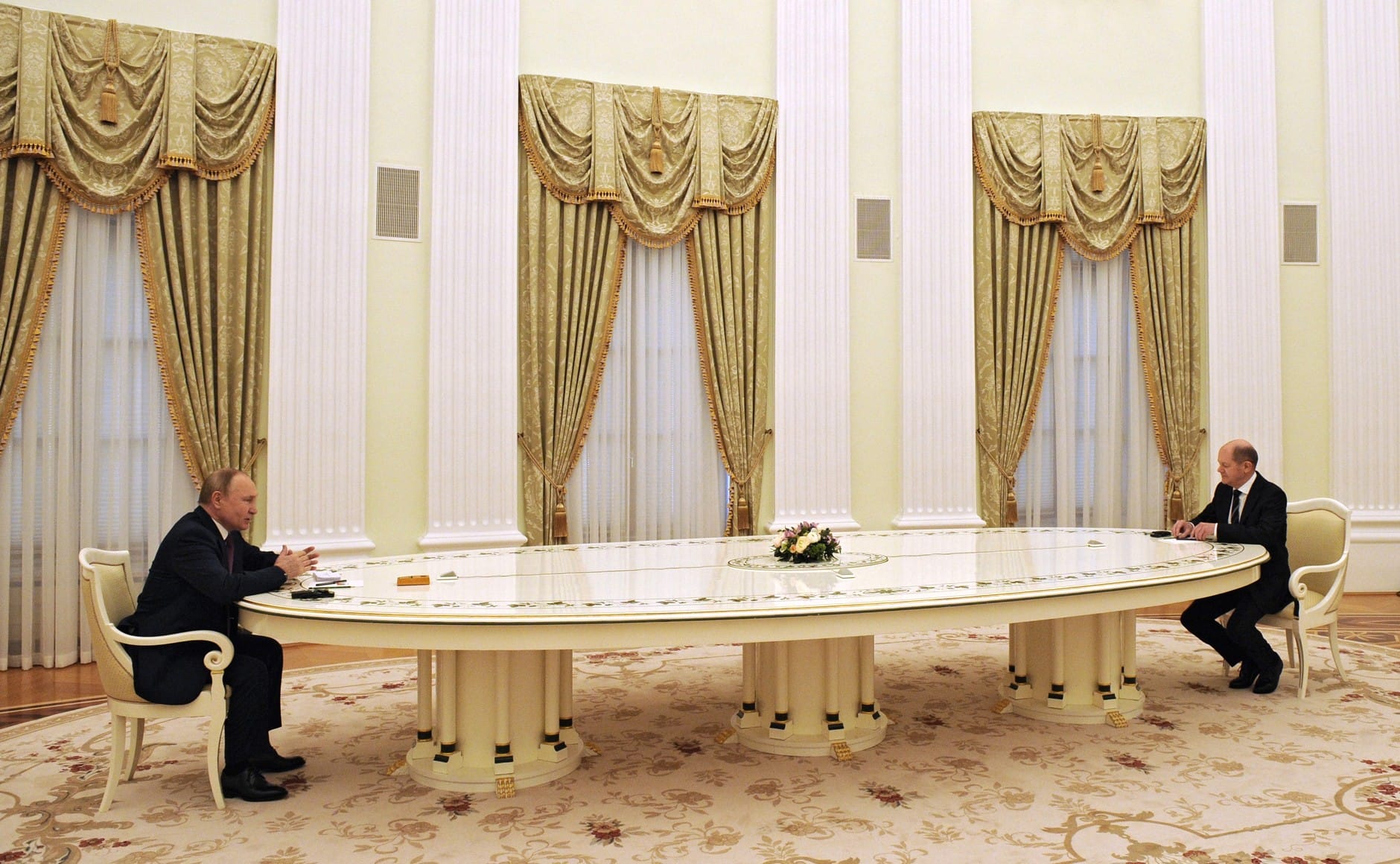
On Tuesday, February 15th, German Chancellor Olaf Scholz arrived in Moscow to meet with Russian President Vladimir Putin to discuss, among other things, the Russian-Ukrainian conflict, Nord Stream 2, and the recent banning of the Deutsche Welle in Russia.
Upon arrival, Scholz refused to take a Russian PCR-test and instead opted to be tested by a doctor from the German embassy in Moscow. This, he said, was “a sign of independence” rather than motivated by worries about his DNA being taken by the Russians.
On the topic of Ukraine, Scholz urged Putin at the meeting to “continue discussing these matters on the path of dialogue.” The German chancellor stressed that it would be a great “misfortune” if the dialogue would lead “to a dead end.” For Scholz, there was no good reason for the Russian troop amassment at the Ukrainian border; as such, he welcomed the beginning troop withdrawal earlier that day as a “good sign.” Scholz underlined the importance of working out European security policies together with Russia, rather than against it. The diplomatic possibilities of doing so were “far from exhausted,” Scholz said.
“For my generation, war in Europe has become unthinkable,” Scholz continued, “and we have to make sure it stays that way.” President Putin, on the other hand, emphasized that Russia has no interest in a war with Ukraine. “Do we want this, or do we not?” asked Putin, giving the answer himself: “Of course, not.” The Russian president confirmed his willingness “to cooperate in questions of European security” and to “continue negotiations.”
For the Russian president, these negotiations include also the use of the Nord Stream 2 pipeline. During his meeting with Scholz, Putin promoted the project as an important contribution to providing Europe with stable and secure energy. He referred to it as an economical and environment-friendly project “without political connotations.” Putin reminded Scholz also of the importance of Russian gas specifically for Germany, which makes gas a lot cheaper for German consumers than for those in other countries. Putin didn’t hesitate to mention the gratitude Germans owed to former Chancellor Gerhard Schröder—also a member of the Social-Democratic Party in Germany, just like Scholz. Schröder had recently been criticized from within his party for his collaboration with Russian energy corporations such as Gazprom and Rosneft, and this nod by Putin deftly delivered the intended jab it was meant to be.
As previously reported in The European Conservative, U.S. President Joe Biden had expressed in a meeting with Scholz on February 7th his willingness to use Nord Stream 2 as a pressure tool against Russia. Scholz himself has been less outspoken on these matters, but added in his meeting with Vladimir Putin that “with regards to the pipeline, we all know what the matter at hand is.”
Scholz insisted that the transit of gas in Europe must be secured “via Ukraine, via Belarus and Poland, via Nord Stream 1, all according to the agreements made in the past.” On his end, Putin offered—if Western nations wished so—to continue transferring gas via Ukraine beyond the year 2024.
Other topics discussed between the two heads of state included the recent ban of the Deutsche Welle in Russia in response to the previous German ban of Russia Today, which Scholz bemoaned as well as the “shrinking spaces for civil society” in Russia, such as the unlawful imprisonment of opposition politician Alexej Nawalny. The German chancellor did, however, emphasize the “historical and cultural ties” of both nations, which would lend themselves to a multitude of relations and offer great potential for economic growth.
The meeting between Scholz and Putin took place at the height of Ukrainian-Russian tensions. Some media outlets have reported information on an impending invasion by Russia for Wednesday night, a claim that not only Russia but also Ukraine refuted. On Tuesday morning, some of the Russian troops stationed at the Ukrainian border were withdrawn, a step that Dmitrij Peskov, speaker of the Kremlin, explained as “usual process” to mark the end of the military exercises in that region.
